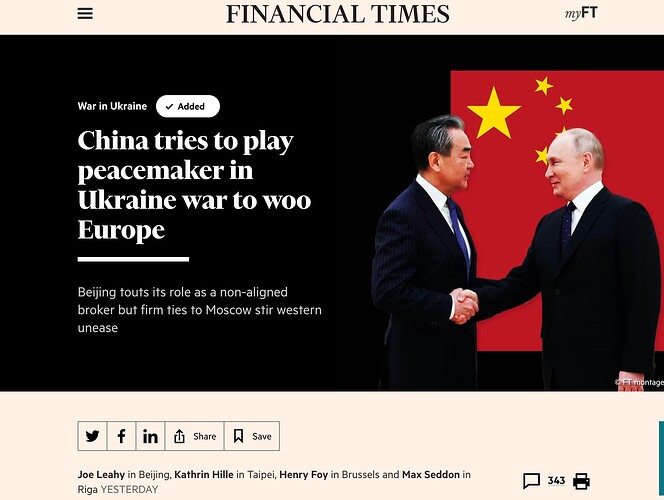-
北京的最高外交官王毅本周访问了莫斯科,赞扬了中国和俄罗斯之间 "成熟 "和 "稳定 "的关系。王毅的访问预计将以中国发布的乌克兰和平建议结束。他对俄罗斯的热情话语在西方引起了忧虑,因为中国声称对乌克兰战争持中立态度。
-
该和平计划是中国平衡其与俄罗斯和西方关系的一次尝试。中国希望防止俄罗斯遭受灾难性的失败,同时改善与欧洲的关系,恢复外国投资和贸易。
-
新加坡南洋理工大学教授李明江指出,乌克兰战争是中国被置于守势的一个主要原因。中国希望做些什么来应对这种情况,并改善与欧洲的关系。
-
北京因其对乌克兰的立场而面临来自美国和欧盟的大量批评。
-
习近平主席尚未给乌克兰总统-泽伦斯基打电话,也没有谴责入侵行为。
-
中国增加了与俄罗斯的贸易,1月份的进口额达到了创纪录的水平。
-
美国驻欧盟大使Mark Gitenstein注意到欧盟对中国的看法发生了转变。
-
美国国务卿安东尼-布林肯警告说,中国可能正在向俄罗斯提供致命的援助。
-
王毅一直在推动欧盟的支持,并与德国总理Olaf Scholz、法国总统Emmanuel Macron和乌克兰外交部长Dmytro Kuleba等领导人会面。
-
由于华盛顿击落了一个疑似间谍气球,美中关系已经恶化。
-
西方世界对北京在乌克兰问题上的立场越来越持怀疑态度。
-
中国对美国的警告做出了回应,指责他们用自己的武器运输来助长危机。
-
王毅在西方的 "魅力攻势 "并不成功,Alicia Kearns说 “没有人被它说服”。
-
尽管如此,有迹象表明,欧洲私营部门对中国市场的兴趣正在恢复。
-
北京的和平外交可能是为了帮助俄罗斯找到摆脱冲突的方法,同时避免普京政权的灾难。
-
外交部表示,和平建议将重申习近平的呼吁,即尊重主权和领土完整,“认真对待所有国家的合法安全关切”,维护联合国宪章,避免核战争。
-
亚历山大-加布耶夫认为,相对于可行的解决方案,和平计划将更像是一个框架。
-
中国意识到普京对战争的执着和乌克兰继续战斗的意愿。
-
西方对乌克兰的支持依然强劲。
-
和平计划将是一个原则框架,而不是可行的解决方案。
-
总部设在北京的中国与全球化中心主席王辉耀建议,谈判可以涉及联合国安理会五个常任理事国,加上欧盟和乌克兰。
-
乌克兰正在等待看到该计划的实际文本,因为大多数分析家预计它几乎不涉及具体内容。
-
停火可能是谈判的一部分,但乌克兰及其西方伙伴可能会要求俄罗斯首先从被占领土撤出。
-
南洋理工大学的Li建议中国增加与乌克兰的接触,即使只是一个电话,作为改善与欧洲关系的一个有意义的方式。
-
Beijing’s top diplomat Wang Yi visited Moscow this week, praising the “mature” and “stable” relationship between China and Russia. Wang’s visit is expected to conclude with China’s release of a Ukraine peace proposal. His warm words for Russia have caused apprehension in the West, as China claims neutrality on the war in Ukraine.
-
The peace plan is an attempt by China to balance its relationship with both Russia and the West. China wants to prevent Russia from suffering a catastrophic defeat, as well as improve relations with Europe and revive foreign investment and trade.
-
Li Mingjiang, a professor at Nanyang Technological University in Singapore, states that the Ukraine war has been a major source of China being put on the defensive. China wants to do something to counter this and improve its relationship with Europe.
-
Beijing is facing considerable criticism from the US and EU for its stance on Ukraine.
-
President Xi Jinping has yet to call Ukraine’s president Volodymyr Zelenskyy or condemn the invasion.
-
China has increased its trade with Russia, with record levels of imports in January.
-
US Ambassador to the EU, Mark Gitenstein, has noticed a shift in the EU’s opinion of the PRC.
-
US Secretary of State Antony Blinken has warned that China may be providing lethal aid to Russia.
-
Wang Yi has been pushing for EU support and has met with leaders such as German Chancellor Olaf Scholz, French President Emmanuel Macron and Ukraine’s foreign minister Dmytro Kuleba.
-
US-China relations have deteriorated due to Washington’s shooting down of a suspected spy balloon.
-
There is a growing skepticism in the western world towards Beijing’s stance on Ukraine.
-
China has responded to the US warning by accusing them of fuelling the crisis with their own weapons shipments.
-
Wang Yi’s “charm offensive” in the West has been unsuccessful, with Alicia Kearns saying “no one is convinced” by it.
-
Despite this, there are signs of European private sector interest in the Chinese market returning.
-
Beijing’s peace diplomacy may be aimed at helping Russia find a way out of the conflict, while avoiding disaster for the Putin regime.
-
The foreign ministry has said the peace proposal will reaffirm Xi’s calls to respect sovereignty and territorial integrity, “take seriously the legitimate security concerns of all countries”, uphold the UN Charter and avoid nuclear war.
-
Alexander Gabuev believes the peace plan will be more of a framework, as opposed to workable solutions.
-
China is aware of Putin’s obsession with the war and Ukraine’s willingness to continue fighting.
-
Western support for Ukraine remains strong.
-
The peace plan will be a framework of principles, rather than workable solutions.
-
Henry Huiyao Wang, president of the Beijing-based Center for China and Globalization, suggested that negotiations could involve the five permanent UN Security Council members, plus the EU and Ukraine.
-
China favours a UN approach and is proposing a peace plan.
-
Ukraine is waiting to see the actual text of the plan, as most analysts expect it to involve few specifics.
-
A ceasefire is likely to be part of the negotiations, but Ukraine and its western partners will likely require Russia to withdraw from occupied territories first.
-
On Thursday, the UN will vote on a Kyiv-authored resolution calling for Russia’s withdrawal, on which China is expected to abstain.
-
Li of Nanyang Technological University suggested China increase engagement with Ukraine, even if it’s just a phone call, as a meaningful way to improve relations with Europe.
